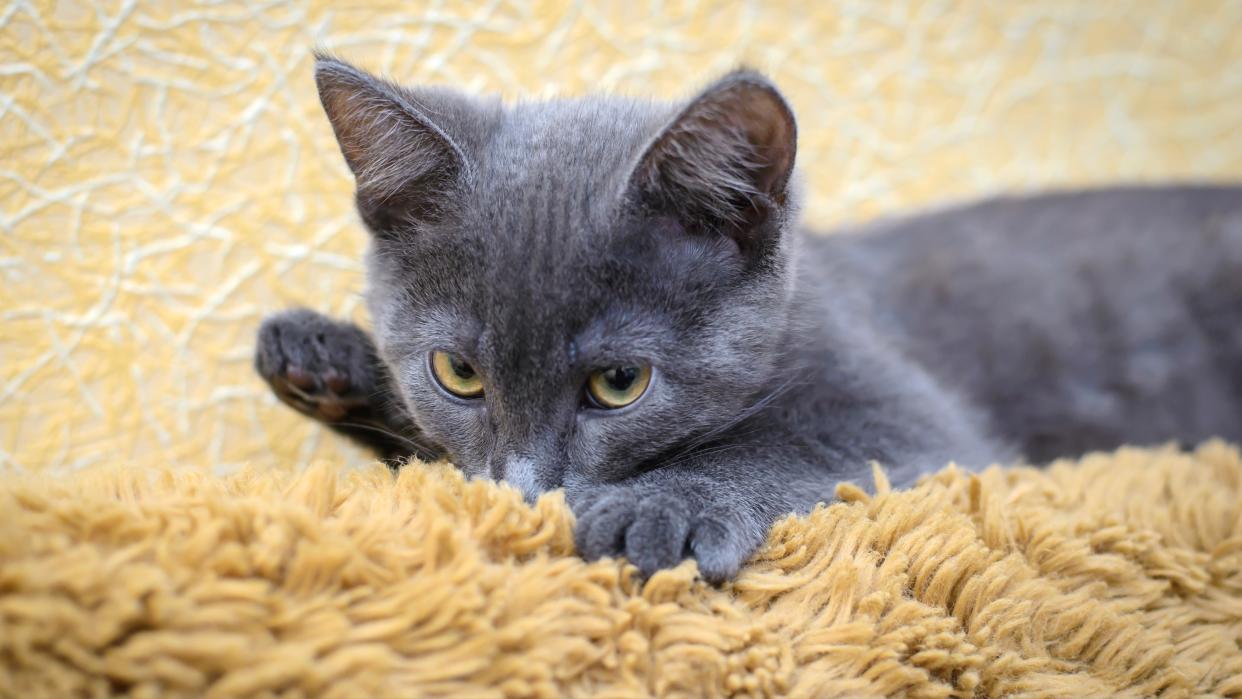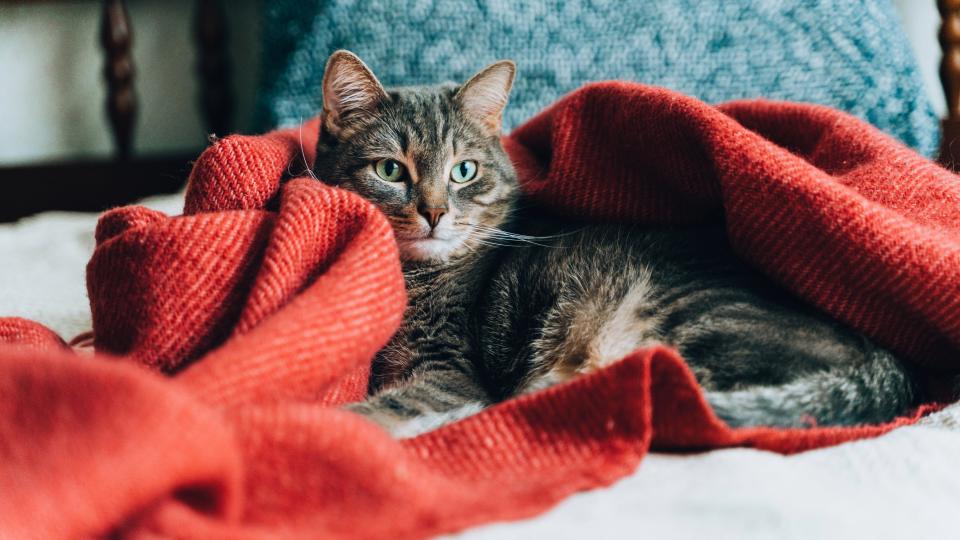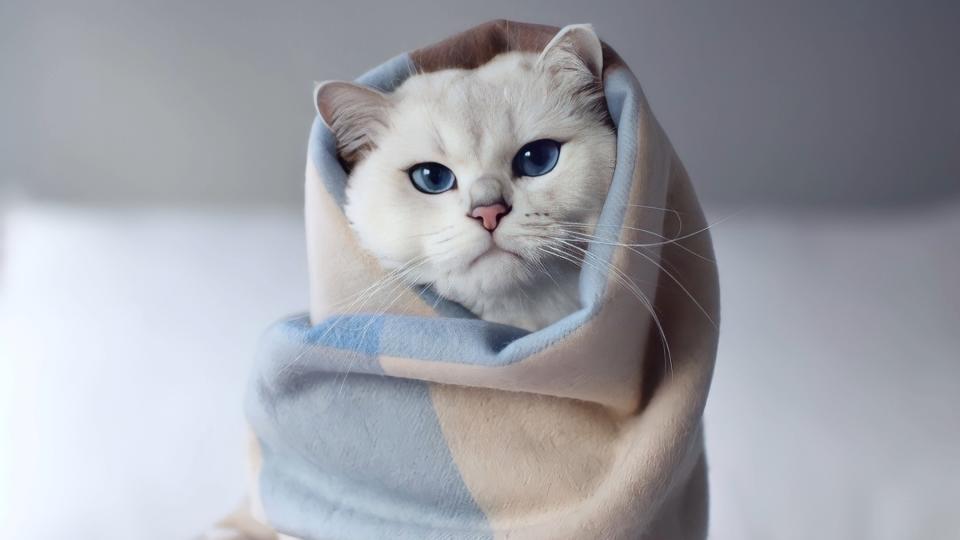Why do cats suck on blankets? Vet reveals 6 common reasons (and what you can do about it)

Why do cats suck on blankets? It's a question you may find yourself asking if you regularly notice your feline friend sucking away on their bedding — or yours!
While it may seem odd to us humans, blanket suckling is common in cats and is typically used as a self-soothing tool to help them feel calm and relaxed.
There are certainly things you can do to try to stop or lessen this behavior, such as investing in the best automated cat toys to ensure your feline friend is getting the physical and mental enrichment they need, however, blanket sucking is a normal behavior and is generally nothing to worry about.
We were keen to find out more about our feline friends fascination with blankets, so we turned to expert vet Dr. Rebecca MacMillan. Below, she explains the most common reasons cats suck on blankets, whether it poses any health risks, and her top tips if you're wanting to put a stop to it. Here's what she had to say...
Why do cats suck on blankets?
If you're anything like us, you spend your days asking yourself a ton of questions related to your feline friend's seemingly puzzling behavior.
Why do cats like to be in boxes, for example, or why do cats loaf? So it's no surprise that we'd also be asking ourselves why cats love to suck on blankets so much!
Thankfully, Dr. MacMillan has plenty of insight into the reasons behind this behavior — and some of what she had to share really surprised us.
1. It's a natural instinct
There are lots of strange or funny things cats do that are actually completely normal, and as it turns out, sucking on blankets is one of those things.
"As a kitten, suckling is an instinctive behavior that releases feel-good
hormones and allows them to successfully feed from their mother," explains MacMillan. "This natural instinct can follow through into adulthood, with some cats reliving the comfort and relaxation that they got from sucking as a youngster."
2. They were weaned too early
The newborn kitten phase is a delicate one where the youngest of our fur friends require a lot of love and nurturing from their mother — being removed too early from their care has the potential to cause problems.
"Kittens that were weaned from their mother too early may be more likely to
suckle on items like blankets. We think that this is because they were
stopped abruptly, before they were ready, making them more likely to hold on to
this behavior until later in life," says MacMillan.
3. It provides comfort
"A bit like some teenagers or adults that still suck their thumbs, some
cats just enjoy the comfort that suckling brings them. It may become a habit and
could be their go-to mechanism to help them to sleep as well," MacMillan explains.

4. They may be feeling stressed or anxious
We often associate stress and anxiety as something only we humans feel, but anxiety in cats is more common than you might think.
"When some cats feel stressed or anxious they may resort to coping mechanisms that they know feel good or help them to relax, like sucking on bedding," MacMillan confirms.
It's important to note that things that may not feel like stressors to us can be huge sources of anxiety for our kitty companions. Things like moving their litter box, changing their feeding time, having guests stay over or remodelling the house can all trigger a stress response in cats.
If you're concerned stress or anxiety may be behind your cat's blanket sucking behavior, here's 32 ways to destress your cat that will go a long way in helping them relax.
5. Boredom
Is your cat bored? If they're sucking on blankets, they may well be. While you wouldn't necessarily associate boredom with blanket sucking, MacMillan says cats that are under-stimulated may well result to this behavior.
"If your cat has nothing better to do, then they may resort to their habit of blanket sucking. Sometimes this has the added benefit of getting additional attention from you!"
6. Genetics
"It is possible that some breeds are more likely to blanket suck than others. Burmese and siamese cats are said to demonstrate sucking behavior more frequently than other types of cats, which suggests there is a genetic component," MacMillan explains.
Can cats get sick from sucking on blankets?
Is my cat sick? It's a question you may worry about if you find your kitty frequently sucking on blankets. However, rest assured, it's usually nothing to worry about.
"Sucking blankets is unlikely to cause your kitten any harm unless they start
chewing and causing damage to the bedding," MacMillan says. "Pieces of blanket or long fibers/threads could cause problems if swallowed.
Undigestible material trapped in the digestive tract is called a foreign body, and it could create issues like vomiting, diarrhea, and even serious damage to the bowels.
So, to keep your cat safe, check their blankets regularly and remove them promptly if there are any signs of wear and tear."
How to stop a cat from sucking on blankets

For the most part, sucking is a soothing and calming activity for cats, so most of the time it's best to let them exercise this natural behavior.
However, if you feel like the sucking is excessive or is resulting in health issues such as vomiting or gastric upset, MacMillan says there are some simple things you can do.
1. Ensure they have everything they need
Meeting your cat's environmental needs can go a long way in reducing sucking behaviors.
"Make sure all your cat’s needs are met, particularly their need for comfort and
security. This means making sure they have cozy rest areas, plenty of toys, a
scratch post, and appropriate litter trays," MacMillan advises.
Our guides to the best cat scratching posts and the best cat toys are a great place to start if you're in search of some inspiration.
2. Minimize stress
If you think your cat's blanket sucking is being triggered by stress and anxiety, see if you can pinpoint the trigger and do your best to reduce or eliminate it.
"Minimize stress in the environment by making sure your cat has sufficient
quiet time and can escape to an area of the house where they won’t be disturbed
by people or other pets. You could also use a calming pheromone diffuser in the environment to help, especially if your cat is made anxious by specific events like
fireworks, house renovations, or visitors," says MacMillan.
3. Provide them with lots of mental stimulation
Most cats love to play, so it's important you give them an outlet for this 2-3 times a day for 15-20 minutes at a time.
"Ensure your cat has plenty of mental stimulation each day," MacMillan advises. "This will reduce the risk of boredom and anxiety. Play with your cat and make sure they have a variety of toys that stimulate their other natural instincts like hunting."
We highly recommend the best interactive cat toys when it comes to having fun with your feline, and for those times when you're too busy to play, the best cat puzzle feeder will keep them occupied while giving their brain a good workout at the same time.
4. Get regular vet checks
"Don’t forget to take your cat for regular check-ups with your vet," stresses MacMillan. "This ensures that your pet is in top form and that no underlying health issues are developing that could be impacting their behavior."

Feliway Classic 30 Day Starter Kit Calming Diffuser for Cats
$19.90 from Chewy
Mimicking the pheromones your cat naturally produces, this diffuser is a great drug-free solution that may help to reduce the signs of stress in your feline friend.View Deal
Looking for more great kitty content? Here's 32 ways to bond with your cat and a roundup of our favorite ways to be the best cat owner.

